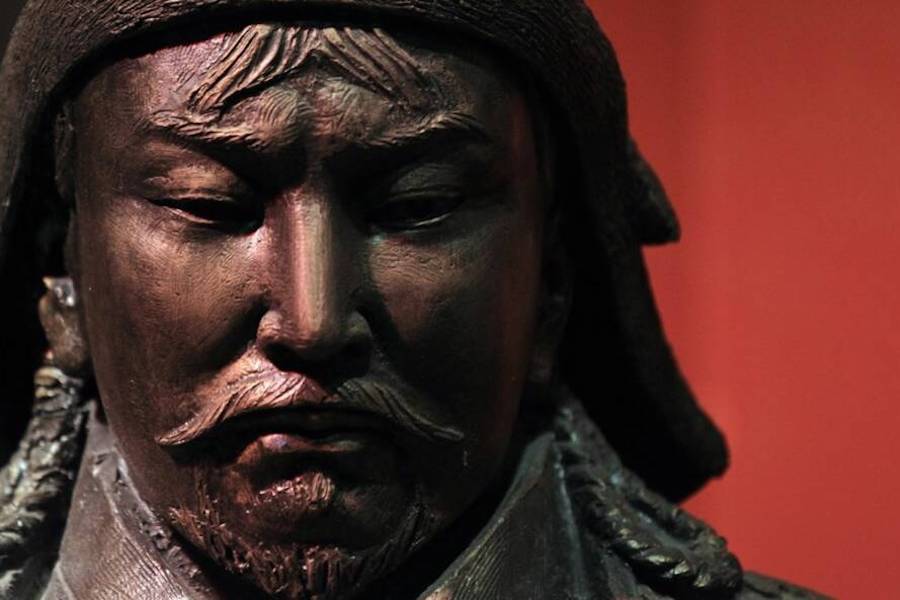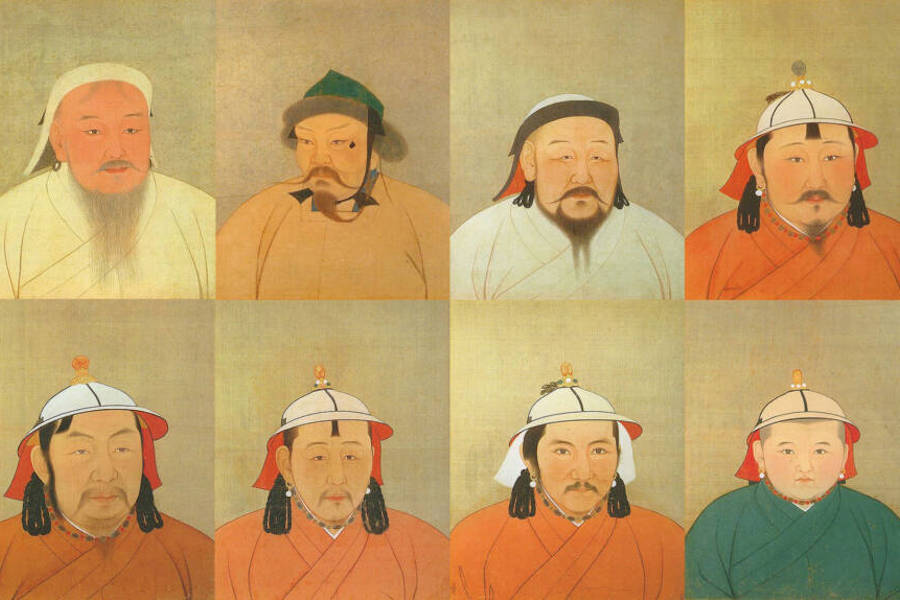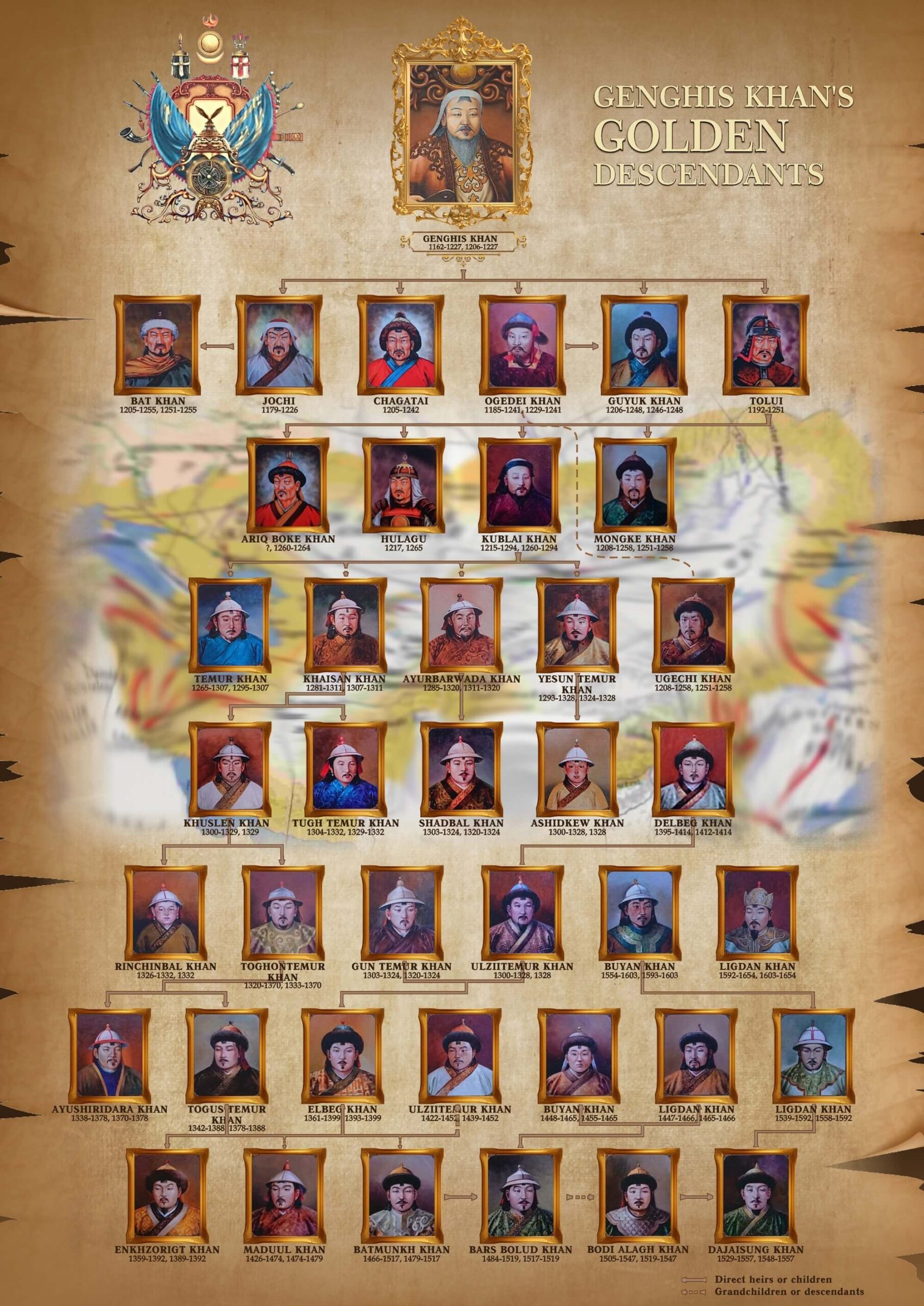Genghis Khan children have been a subject of fascination and scholarly study for centuries. As the founder of the Mongol Empire, Genghis Khan's lineage and descendants played a significant role in shaping history. His children inherited his vast empire and expanded it further, leaving an indelible mark on the world. This article explores the lives, contributions, and legacy of Genghis Khan's children, shedding light on their impact on history.
Genghis Khan's rise to power was nothing short of extraordinary. Born as Temujin in the early 12th century, he united the nomadic tribes of the Mongolian steppes and established one of the largest empires in history. His military prowess and strategic brilliance laid the foundation for a legacy that would endure for generations. However, much of this legacy was carried forward by his children, who played pivotal roles in maintaining and expanding the Mongol Empire.
This article delves into the lives of Genghis Khan's children, examining their contributions, achievements, and the challenges they faced. By exploring their biographies and the impact they had on the empire, we gain a deeper understanding of the lasting influence of Genghis Khan's family. Let's begin our journey into the fascinating world of Genghis Khan's children.
Table of Contents
- Biography of Genghis Khan
- Overview of Genghis Khan's Children
- Jochi: The Eldest Son
- Chagatai: The Temperamental Ruler
- Ogedei: The Great Khan
- Tolui: The Warrior and Father of Kublai Khan
- The Daughters of Genghis Khan
- The Legacy of Genghis Khan's Children
- Genetic Impact and Modern-Day Descendants
- Historical Significance and Influence
Biography of Genghis Khan
Genghis Khan, born Temujin in 1162, rose from humble beginnings to become one of history's most formidable leaders. His early life was marked by hardship and struggle, but his determination and leadership qualities set him apart. By 1206, he had united the Mongol tribes under his banner and declared himself Genghis Khan, the "Universal Ruler." His conquests spanned across Asia and parts of Europe, creating the largest contiguous land empire in history.
Genghis Khan's Family Structure
Genghis Khan's family structure was complex and expansive. He had multiple wives and concubines, which led to a large number of children. His primary wife, Börte, bore him four sons: Jochi, Chagatai, Ogedei, and Tolui. These sons played crucial roles in the administration and expansion of the Mongol Empire. Additionally, Genghis Khan had several daughters who were married into alliances to strengthen his empire's ties with neighboring tribes and nations.
Overview of Genghis Khan's Children
Genghis Khan's children were instrumental in the success and continuation of the Mongol Empire. Each of his sons and daughters contributed uniquely to the empire's growth and stability. Below is an overview of his children and their roles:
Key Contributions
- Jochi: The eldest son, known for his military prowess and leadership in the northern territories.
- Chagatai: The second son, who became a staunch defender of Mongol traditions and ruled Central Asia.
- Ogedei: The third son, who succeeded Genghis Khan as the Great Khan and expanded the empire further.
- Tolui: The youngest son, who played a crucial role in military campaigns and was the father of Kublai Khan.
- Daughters: Genghis Khan's daughters were married into alliances, ensuring political stability and expanding the empire's influence.
Jochi: The Eldest Son
Jochi, the eldest son of Genghis Khan, was a key figure in the early expansion of the Mongol Empire. Born to Börte, Jochi's legitimacy was often questioned due to rumors surrounding his birth. Despite these doubts, Jochi proved himself as a capable military leader and played a vital role in the conquests of Central Asia and Russia.
Military Achievements
Jochi's military campaigns were instrumental in securing the northern territories of the Mongol Empire. His leadership style and strategic thinking earned him respect among his troops and adversaries alike. However, tensions with his brothers, particularly Chagatai, complicated his relationship within the family and the empire.
Chagatai: The Temperamental Ruler
Chagatai, the second son of Genghis Khan, was known for his strong personality and adherence to Mongol traditions. He ruled over the Chagatai Khanate, which encompassed much of Central Asia. Chagatai was a staunch defender of Mongol customs and often clashed with his siblings over governance and succession issues.
Political Influence
Chagatai's influence extended beyond his immediate territory. He played a significant role in shaping the policies of the Mongol Empire and ensuring the preservation of Mongol culture. His legacy is evident in the enduring traditions and customs that survived long after the empire's decline.
Ogedei: The Great Khan
Ogedei, the third son of Genghis Khan, succeeded his father as the Great Khan of the Mongol Empire. His reign marked a period of significant expansion and consolidation of the empire. Ogedei's leadership style was characterized by his ability to balance military conquests with administrative reforms, ensuring the stability and prosperity of the empire.
Expansion and Administration
Under Ogedei's rule, the Mongol Empire expanded into China, Persia, and Eastern Europe. He implemented administrative reforms that facilitated trade and communication across the vast empire. Ogedei's reign is often regarded as the golden age of the Mongol Empire, a testament to his effective leadership and vision.
Tolui: The Warrior and Father of Kublai Khan
Tolui, the youngest son of Genghis Khan, was a formidable warrior and played a crucial role in the military campaigns of the Mongol Empire. Although he did not become the Great Khan, Tolui's lineage was significant as he was the father of Kublai Khan, who later established the Yuan Dynasty in China.
Legacy Through Descendants
Tolui's legacy extended through his descendants, who went on to rule various parts of the Mongol Empire. His son, Kublai Khan, became one of the most prominent figures in Mongol history, known for his establishment of the Yuan Dynasty and his efforts to integrate Chinese culture into Mongol governance.
The Daughters of Genghis Khan
Genghis Khan's daughters, though often overshadowed by their brothers, played crucial roles in the empire's expansion and stability. They were married into alliances with neighboring tribes and nations, ensuring political stability and expanding the empire's influence. These strategic marriages were a testament to Genghis Khan's foresight and diplomatic acumen.
Strategic Marriages
The daughters of Genghis Khan were strategically married to leaders of neighboring tribes and nations. These alliances strengthened the empire's ties and ensured the loyalty of potential adversaries. Through these marriages, Genghis Khan's daughters contributed significantly to the empire's growth and stability.
The Legacy of Genghis Khan's Children
The legacy of Genghis Khan's children is evident in the enduring impact they had on the Mongol Empire and the world. Their contributions to the expansion, administration, and preservation of the empire ensured its longevity and influence. The descendants of Genghis Khan continued to shape history long after his death, leaving an indelible mark on the world.
Enduring Influence
The influence of Genghis Khan's children extended beyond their lifetimes. Their descendants ruled various parts of the Mongol Empire and played crucial roles in shaping the political and cultural landscape of Asia and Europe. The legacy of Genghis Khan's children is a testament to their enduring impact on history.
Genetic Impact and Modern-Day Descendants
Research has shown that Genghis Khan's genetic legacy is still present in modern populations. A study published in the American Journal of Human Genetics revealed that approximately 0.5% of the world's male population carries a specific Y-chromosome lineage traced back to Genghis Khan. This genetic impact highlights the vast reach and influence of Genghis Khan's descendants.
Modern-Day Descendants
Today, many people claim descent from Genghis Khan, with some even holding prominent positions in politics and society. The genetic legacy of Genghis Khan serves as a reminder of his lasting influence and the far-reaching impact of his empire.
Historical Significance and Influence
The historical significance of Genghis Khan's children cannot be overstated. Their contributions to the Mongol Empire and the world have shaped history in profound ways. From their military conquests to their administrative reforms, Genghis Khan's children left an indelible mark on the world.
Impact on Global History
The impact of Genghis Khan's children on global history is evident in the cultural, political, and economic developments that followed their reigns. Their influence extended beyond the borders of the Mongol Empire, shaping the course of history in Asia, Europe, and beyond.
Conclusion
Genghis Khan children have played a pivotal role in shaping history and leaving a lasting legacy. From their military conquests to their administrative reforms, the children of Genghis Khan contributed significantly to the success and continuation of the Mongol Empire. Their influence extended far beyond their lifetimes, shaping the political and cultural landscape of the world.
We invite you to share your thoughts and insights in the comments section below. Additionally, explore other articles on our site to deepen your understanding of history and its fascinating figures. Together, let's continue to unravel the mysteries of the past and appreciate the enduring legacy of those who shaped our world.


